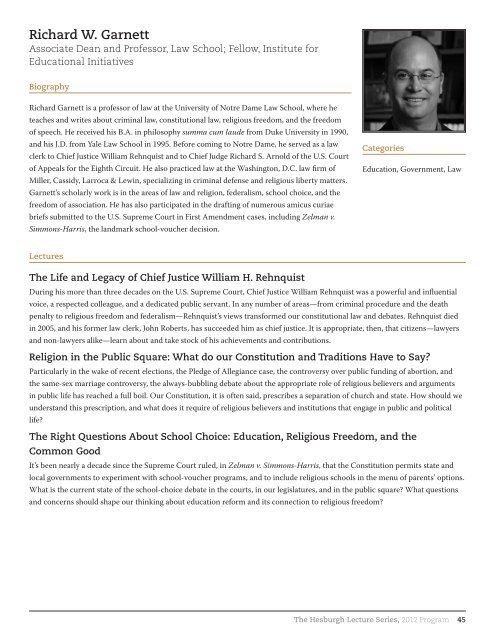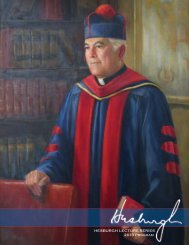HESBURGH LECTURE SERIES 2012 Program - Alumni Association ...
HESBURGH LECTURE SERIES 2012 Program - Alumni Association ...
HESBURGH LECTURE SERIES 2012 Program - Alumni Association ...
Create successful ePaper yourself
Turn your PDF publications into a flip-book with our unique Google optimized e-Paper software.
Richard W. Garnett<br />
Associate Dean and Professor, Law School; Fellow, Institute for<br />
Educational Initiatives<br />
Biography<br />
Richard Garnett is a professor of law at the University of Notre Dame Law School, where he<br />
teaches and writes about criminal law, constitutional law, religious freedom, and the freedom<br />
of speech. He received his B.A. in philosophy summa cum laude from Duke University in 1990,<br />
and his J.D. from Yale Law School in 1995. Before coming to Notre Dame, he served as a law<br />
clerk to Chief Justice William Rehnquist and to Chief Judge Richard S. Arnold of the U.S. Court<br />
of Appeals for the Eighth Circuit. He also practiced law at the Washington, D.C. law firm of<br />
Miller, Cassidy, Larroca & Lewin, specializing in criminal defense and religious liberty matters.<br />
Garnett’s scholarly work is in the areas of law and religion, federalism, school choice, and the<br />
freedom of association. He has also participated in the drafting of numerous amicus curiae<br />
briefs submitted to the U.S. Supreme Court in First Amendment cases, including Zelman v.<br />
Simmons-Harris, the landmark school-voucher decision.<br />
Lectures<br />
The Life and Legacy of Chief Justice William H. Rehnquist<br />
Categories<br />
Education, Government, Law<br />
During his more than three decades on the U.S. Supreme Court, Chief Justice William Rehnquist was a powerful and influential<br />
voice, a respected colleague, and a dedicated public servant. In any number of areas—from criminal procedure and the death<br />
penalty to religious freedom and federalism—Rehnquist’s views transformed our constitutional law and debates. Rehnquist died<br />
in 2005, and his former law clerk, John Roberts, has succeeded him as chief justice. It is appropriate, then, that citizens—lawyers<br />
and non-lawyers alike—learn about and take stock of his achievements and contributions.<br />
Religion in the Public Square: What do our Constitution and Traditions Have to Say?<br />
Particularly in the wake of recent elections, the Pledge of Allegiance case, the controversy over public funding of abortion, and<br />
the same-sex marriage controversy, the always-bubbling debate about the appropriate role of religious believers and arguments<br />
in public life has reached a full boil. Our Constitution, it is often said, prescribes a separation of church and state. How should we<br />
understand this prescription, and what does it require of religious believers and institutions that engage in public and political<br />
life?<br />
The Right Questions About School Choice: Education, Religious Freedom, and the<br />
Common Good<br />
It’s been nearly a decade since the Supreme Court ruled, in Zelman v. Simmons-Harris, that the Constitution permits state and<br />
local governments to experiment with school-voucher programs, and to include religious schools in the menu of parents’ options.<br />
What is the current state of the school-choice debate in the courts, in our legislatures, and in the public square? What questions<br />
and concerns should shape our thinking about education reform and its connection to religious freedom?<br />
The Hesburgh Lecture Series, <strong>2012</strong> <strong>Program</strong> 45



